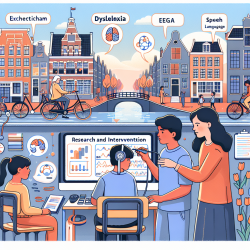As a practitioner dedicated to improving outcomes for children with dyslexia, leveraging the latest research is crucial. The research article "Dyslexia, the Amsterdam Way" provides a wealth of insights that can be implemented to enhance both assessment and intervention strategies.
Key Findings from the Research
The research conducted at the University of Amsterdam's Rudolf Berlin Center emphasizes the importance of phonological skills, particularly letter-speech sound mapping and word decoding. These skills are critical for reading acquisition and fluency. The research highlights four main areas:
- Artificial Script Reading: Using an artificial script to control for script-exposure differences between dyslexic and typical readers, demonstrating that children with dyslexia struggle with letter-speech sound mapping.
- Diffusion Modeling: This technique provided a unified account of speed and accuracy in word decoding, revealing that dyslexic children have lower drift rates and wider boundary separations, indicating difficulties in linguistic decision processes.
- Event-Related Brain Potentials (ERPs): Analysis of the N170 component showed that typical readers have reduced N170 amplitude over the left hemisphere, suggesting facilitated lexical access, a pattern not observed in dyslexic readers.
- Graph Analysis of EEG: This analysis revealed less efficient brain networks in dyslexic children, indicating reduced functional specialization compared to typical readers.
Implementing the Research in Practice
To improve your practice, consider the following steps based on the research findings:
- Assessment: Utilize tasks that measure letter-speech sound mapping and word decoding, such as artificial script tasks, to better identify children at risk for dyslexia.
- Intervention: Implement interventions that focus on phonological skills, particularly letter-speech sound mapping. Computerized programs like LEXY, which focus on the phonological structure of words, have shown significant improvements in reading accuracy and fluency.
- Monitoring Progress: Use EEG and ERP measurements to monitor neural changes in response to intervention. Normalization of the N170 amplitude can be an indicator of successful intervention.
- Network Analysis: Consider employing network analysis to understand the complex interactions between different cognitive and neural factors in dyslexia. This can help tailor interventions to individual needs.
Encouraging Further Research
While the research provides valuable insights, continuous exploration is essential. Practitioners are encouraged to stay updated with the latest findings and consider participating in or conducting further research to refine assessment and intervention strategies.
To read the original research paper, please follow this link: Dyslexia, the Amsterdam Way.










